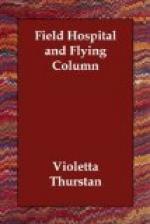The hospital began to grow empty and the work slackened down, as every possible patient was sent away to Moscow or Petrograd to make room for the rush of wounded that must be coming from the Lodz direction. But no patients arrived, and we heard that the railway communications had been cut. But this proved to be untrue.
One Sunday afternoon Sister G. and I, being free, betook ourselves to tea at the Hotel d’Europe—that well-named hostelry which has probably seen more history made from its windows than any other hotel in Europe. We favoured it always on Sunday when we could, for not only was a particularly nice tea to be had, but one could also read there a not too old French newspaper. I think just at first we felt almost as cut off from news of what was happening on the English side as we did in Belgium. No English or French papers could be bought and the Polish and Russian papers were as sealed books to us, and when I did succeed in getting some long-suffering person to translate them to me, the news was naturally chiefly of the doings of the Russian side. Later on I had English papers sent out to me which kept me in touch with the western front, and also by that time, too, I could make out the substance of the Russian papers; but just at first it was very trying not to know what was going on. We had had tea and had read of an Anglo-French success near Ypres and returned rested and cheered to the hospital to find Sister Superior asking for us. She had had a message from the Red Cross Office that we were to go to Lodz next day, and were to go at once to the Hotel Bristol to meet Prince V., who would give us full particulars.
We went off at once to the Bristol and saw Prince V., but did not get any particulars—that was not the Prince’s way. He was sitting reading in the lounge when we arrived, a very tall, lean, handsome man with kind brown eyes and a nose hooked like an eagle’s. He greeted us very kindly and said he would take us to Lodz next day in one of the Red Cross automobiles, and that we must be ready at 10 A. M. I think we earned his everlasting gratitude by asking no questions as to where and how we were going to work, but simply said we would be ready at that time and returned to hospital to pack, fully realizing what lucky people we were to be going right into the thick of things, and only hoping that we should rise to the occasion and do the utmost that was expected of us.




